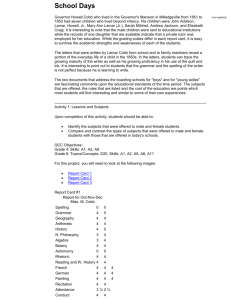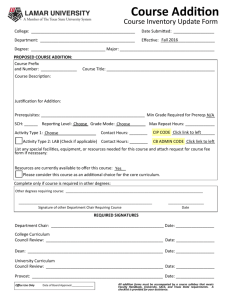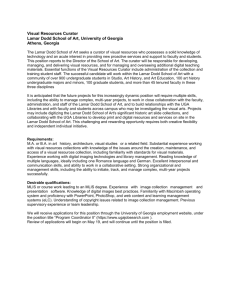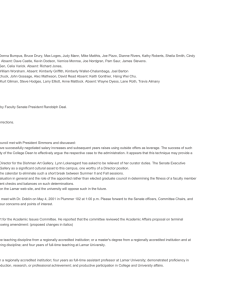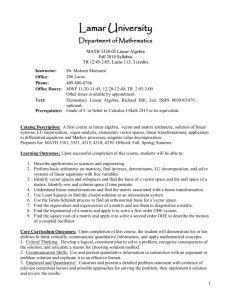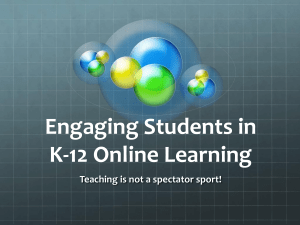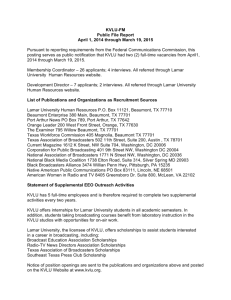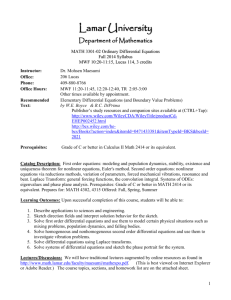BULW 1370 Syllabus
advertisement
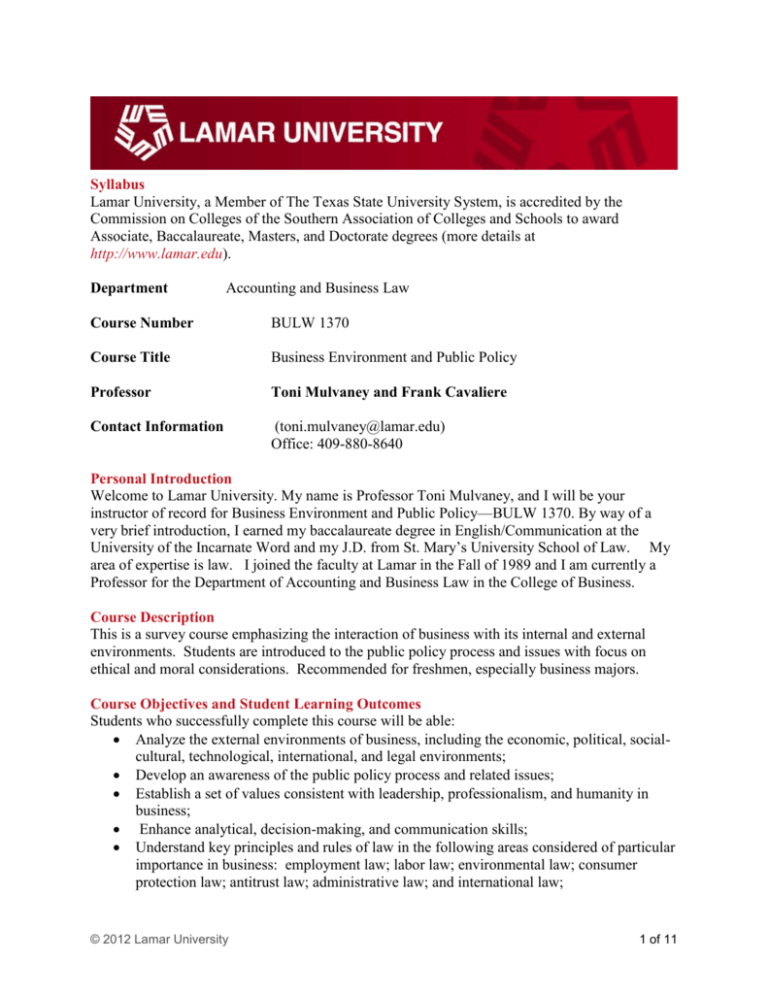
Syllabus Lamar University, a Member of The Texas State University System, is accredited by the Commission on Colleges of the Southern Association of Colleges and Schools to award Associate, Baccalaureate, Masters, and Doctorate degrees (more details at http://www.lamar.edu). Department Accounting and Business Law Course Number BULW 1370 Course Title Business Environment and Public Policy Professor Toni Mulvaney and Frank Cavaliere Contact Information (toni.mulvaney@lamar.edu) Office: 409-880-8640 Personal Introduction Welcome to Lamar University. My name is Professor Toni Mulvaney, and I will be your instructor of record for Business Environment and Public Policy—BULW 1370. By way of a very brief introduction, I earned my baccalaureate degree in English/Communication at the University of the Incarnate Word and my J.D. from St. Mary’s University School of Law. My area of expertise is law. I joined the faculty at Lamar in the Fall of 1989 and I am currently a Professor for the Department of Accounting and Business Law in the College of Business. Course Description This is a survey course emphasizing the interaction of business with its internal and external environments. Students are introduced to the public policy process and issues with focus on ethical and moral considerations. Recommended for freshmen, especially business majors. Course Objectives and Student Learning Outcomes Students who successfully complete this course will be able: Analyze the external environments of business, including the economic, political, socialcultural, technological, international, and legal environments; Develop an awareness of the public policy process and related issues; Establish a set of values consistent with leadership, professionalism, and humanity in business; Enhance analytical, decision-making, and communication skills; Understand key principles and rules of law in the following areas considered of particular importance in business: employment law; labor law; environmental law; consumer protection law; antitrust law; administrative law; and international law; © 2012 Lamar University 1 of 11 Develop an awareness of diversity issues in the workplace. Core Curriculum Objectives This course is designed to meet the Social and Behavioral Sciences Core Curriculum Outcomes; specifically, critical thinking, communication and social responsibility. Social Responsibility: to include intercultural competency, civic knowledge, and the ability to engage effectively in regional, national, and global communities. (See Chapters 5: Corporate Social Responsibility, Chapter 6: Implementing Corporate Social Responsibility, Chapter 7: Business Ethics; Chapter 8: Making Ethical Decisions in Business, Chapter 11: Multinational Corporations, Chapter 12: Globalization, Trade and Corruption, Chapter 16: The Changing Workplace, and Chapter 17: Civil Rights, Women, and Diversity.) Critical Thinking Skills: To include creative thinking, innovation, inquiry, and analysis, evaluation and synthesis of information. (See Critical Thinking Exercise and Rubric attached; and Marketplace-Live Introduction to Business and Strategy Simulation Game, gm.marketplace-live.com; Chapters 2-18 provide end of chapter Case Study with critical thinking questions that are assigned and tested on exams. Each chapter has at least one introductory story that is assigned, discussed and tested over). Communication Skills: to include effective written, oral, and visual communication. (Homework assignments and class participation are factored in as participation grade; for extra credit articles from Business magazines and journals are assigned and students can volunteer to present the article to the class.) Empirical and Quantitative skills: successfully use quantitative concepts to operate a business in an online business simulation game. Academic Prerequisites Admission to Lamar University. Technology Prerequisites Students are not required to have advanced technology training or skills in order to be successful in the class. They should, however, feel confident about their ability to navigate through typical online websites and their ability to use common word processing software in order to submit written assignments. The minimum technical skills and the system requirements for this course: System Requirements Computer/Technology Requirements 1. Students will need regular access to a computer with a broadband Internet connection. The minimum computer requirements are: Any current Flash-compliant browser (recent versions of Firefox or Safari) o Please note that Blackboard may not support Internet Explorer or Chrome. 512 MB of RAM, 1 GB or more preferred Broadband connection (cable modem, DSL, or other high speed) required – courses are heavily video intensive Video display capable of high-color 16-bit display – 1024 x 768 or higher resolution A sound card and speakers or headphones Current anti-virus software must be installed and kept up to date. © 2012 Lamar University 2 of 11 Students will need some additional free software for enhanced web browsing. Be certain to download the free versions of the software. o Adobe Reader o Adobe Flash Player Most home computers purchased within the last 3-4 years meet or surpass these requirements. 2. At a minimum, students must have Microsoft Office 2003, XP, 2007 or OpenOffice, or Student Office for Mac. Microsoft Office is the standard office productivity software utilized by faculty, students, and staff. Microsoft Word is the standard word processing software, Microsoft Excel is the standard spreadsheet software, and Microsoft PowerPoint is the standard presentation software. Copying and pasting, along with attaching/uploading documents for assignment submission will also be required. If you do not have Microsoft Office or Student Office for Mac, you can check with the bookstore to see if they have any student copies. 3. Your computer must be compatible with Blackboard. Please see the Blackboard Supported Browsers and Operating System page to make sure your system will allow you to use all the tools and features available. Technology Skills Requirements You need to be able to: Navigate websites, including downloading and reading files from them. Download and install software or plug-ins such as Adobe Reader, Window Media Player or Flash. Use e-mail, including attaching and downloading documents/files from e-mail. Save files in commonly used word processing formats (.doc, .docx, .rtf). Copy and paste text and other items in computer documents. Save and retrieve documents and files on your computer. Locate information on the Internet using search engines. Locate information in the library using the online catalog. Course Materials Required Text The textbook for this course is Business, Government, and Society by Steiner & Steiner (13th edition 2012). Accessibility Statement It is the policy of Lamar University to accommodate students with disabilities, pursuant to federal and state law. Should you need accommodation, visit the Office for Students with Disabilities website at http://dept.lamar.edu/sfswd or call the office by dialing (409)-880-8347. Also know that I will assist in whatever way I can to ensure that this course supports the university’s commitment to equal education opportunities. Academic Integrity Statement Lamar University expects all students to engage in academic pursuits in a manner that is above reproach. Students are expected to maintain complete honesty and integrity in their academic experiences both in and out of the classroom. Any student found guilty of dishonesty in any © 2012 Lamar University 3 of 11 phase of academic work will be subject to disciplinary action. Disciplinary proceedings may be initiated against a student accused of any form of academic dishonesty including, but not limited to, cheating on an examination or other academic work which is to be submitted, plagiarism, collusion, and the abuse of resource materials. Plagiarism shall mean the appropriation of another’s work or idea and the unacknowledged incorporation of that work or idea into one’s own work offered for credit. Collusion shall mean the unauthorized collaboration with another person in preparing work offered for credit. Abuse of resource materials shall mean the mutilation, destruction, concealment, theft or alteration of materials provided to assist students in the mastery of course materials. Academic work shall mean the preparation of an essay, report, problem, assignment, creative work or other project that the student submits as a course requirement or for a grade. Students are specifically warned against all forms of plagiarism, which include “purchasing, or otherwise acquiring and submitting as one’s own work any research paper or other writing assignment prepared by an individual or firm.” Plagiarism is defined as, “the appropriation and the unacknowledged incorporation of another’s work or ideas into one’s own offered for credit” (82). Students seeking to avoid plagiarism should consult either the course instructor or the most recent addition of the MLA Handbook for Writers of Research Papers. The course instructor will complete a thorough and impartial investigation of any instance of academic dishonesty. A student found guilty of academic dishonesty will be notified in writing by the instructor of the violation, the penalty, and the student’s right to appeal the determination of dishonesty and/or the sanction imposed. Penalties for academic dishonesty in this course will result in either a lowered letter grade or failure of the course as determined by the instructor. Copyright Policy Statement Copyright is defined as the ownership and control of the intellectual property in original works of authorship which are subject to copyright law. As an institution of higher learning that values intellectual integrity, Lamar University prohibits the distribution of published materials (print or electronic) in violation of copyright law. Netiquette (Online Etiquette) Statement Please adhere to the same standards of behavior and professional respect online that you would follow in face-toface communication with others, but most particularly when writing email and when taking part in collaborative and discussion board activities. Lamar provides access to network resources, including the Internet, in order to support learning and to prepare students for the 21st century world. Students, however, are expected to adhere to the Lamar University Acceptable Use Policies when Using Networks Acceptable Use Students must respect the integrity and security of LU's computer systems and network, and the privacy and preferences of other users. Responsibility for learning about and complying with LU's Acceptable Use Policy ultimately rests with the individual. The network may be used to download, copy, or store any software, shareware, digital media files or freeware, as long as the use complies with copyright law; licensing agreements, and campus policies such as storage space limitations and network bandwidth © 2012 Lamar University 4 of 11 restrictions. The network may not be used for any activity, or to transmit any material, that violates United States or local laws. Unacceptable use The network may not be used for commercial purposes. Advertising and sponsorships on UW web sites is restricted. In addition, students may not permit other persons to use their usernames, passwords, accounts or disk space, or disclose their usernames, passwords or account information to any third party. Students may not log on to someone else's account, internet address, or other network codes, or attempt to access another user's files. Students may not create false or dummy accounts to impersonate someone else. Students may not try to gain unauthorized access ("hacking") to the files or computer systems of any other person or organization. Students may not impersonate another person by forging e-mail, web pages or other electronic media. Students who maliciously access, alter, delete, damage or destroy any computer system, computer network, computer program, or data will be subject to disciplinary action by LU, and criminal prosecution as well. Students may not disrupt or attempt to disrupt network traffic, and they may not attempt to monitor or capture network traffic in any way. Finally, students may not intentionally create, store, display, print or transmit information that violates the university’s Sexual Harassment Policy. General Guidelines to Respect All Participants Respect the right of each person to disagree with others. Treat people the same as you would face-to-face. Respect the time of others Guidelines When Communicating with Others (email, discussion, blogging, and etc.) Always sign your names to any contribution you choose to make. Be constructive in your responses to others in the class. Do not use all caps. (Doing so may be interpreted as shouting) Re-read your postings before sending them. Always think before you write. Respond respectively. Use appropriate grammar and structure. Spell-check your postings. Use short paragraphs focused on one idea Use appropriate business language at all times Privacy Policy Statement Student records maintained by Lamar University comply with the Family Education Rights and Privacy Act of 1974 as amended (PL93-380). Detailed information should be accessed through this link: https://sacs.lamar.edu/catalog/PrefMaterial/V.GenAcademicPol.htm#edurights. Grading Policy and Evaluation Teaching Methods: Lectures, discussions, case/company analysis and written assignments are required to effectively teach this course. Due Dates: © 2012 Lamar University 5 of 11 Central Time Zone: All due dates and times on Blackboard are for the Central Time Zone. Late assignments will NOT be accepted—regardless of the reason. When possible, submit projects early in case you have technical or other problems. Each week the new lessons/chapters will start on Monday. Initial Discussion Board posts are due on Wednesday by the end of the day; subsequent posts must be completed before Sunday by the end of the day. Assignments (one per week) are due by Sunday at the end of the day. Marketplace—Live Business Simulation Game Quarter Decisions are due at the end of the day on Sunday Weekly quizzes and your Midterm/Final Exams will be available during the hours of 610 p.m. on Sunday. Blackboard Help: Blackboard support for students is now available after hours (5 p.m.—8 a.m.), on weekends, and on holidays. Please call toll free 1-866-321-7170 for assistance during this time. For Monday-Friday, 8 a.m.-5 p.m., call 409-880-7849. Evaluation Tools: A. Business Simulation Game. Students are required to purchase and participate in the “Introduction to Business and Strategy” computer simulation game. Students will simulate starting up a microcomputer business and running it for 1-½ years. This project will begin in the second week (Instructions for sign-up are linked in Module 1—Week 1). This project will continue each week for six consecutive weeks. The maximum score on this computer simulation is 100 points. Your Quarter Decisions are due at the end of Sunday in Weeks 2-7. The game is complete with step-by-step instructions. Students who read the material will perform well on the simulation. Your score will be evaluated using the Balanced Score Card approach. (100 points) B. Examinations. There will be two examinations, and a comprehensive final. The exams are worth 100 points each. The comprehensive final, covering all the course work for the semester, can be counted twice to replace a student’s lowest test grade, if it is higher than a previous test grade. (300). C. Homework, Discussion and Participation Grade: a. Case Studies. Students will be assigned selected cases from the text. It is every student’s responsibility to read the case and answer the questions that follow it. Exams will include questions about the case studies. In-class discussions will be graded as part of the student’s Participation grade. b. Online Homework Assignments. There will be weekly assignments to be completed on Blackboard for in-class discussion. Students will be called on during discussion and must be prepared to discuss the issues in the assigned readings and videos. D. Extra Credit Assignments. Periodically, assignments from magazines such as Fortune, Forbes, and Business Week will be given. For extra credit, students may volunteer to sign-up to present these articles to the class. Students may earn up to 5 points extra credit for these assignments. To earn the credit, students must read the assigned article, prepare a short summary of the highlights of the article and turn it in to the professor on or before it is due, and orally present the article to the class on the date assigned. Communication rubric will be used to evaluate the student’s presentation. E. Professional Development: Passport to Lamar Program. Online Passport Workshops © 2012 Lamar University 6 of 11 will be available to students in this class. You are required to complete one (1) Passport event for a total of 20 points. Drop Dates This course adheres to the add/drop standards for each term as stated by Lamar University. For more details, refer to the Lamar Academic Calendar. If the link does not work, visit Lamar University at http://www.lamar.edu, and search the site with the term, “Academic Calendar.” Course Evaluation Instruction as well as student performance is subject to evaluation. Procedures for evaluation will be provided near the end of this course. myLamar Portal Students are asked to obtain a Lamar Electronic Account username and password so they can log onto the myLamar Web site. Students may get information on how to get into the myLamar Web site from the University’s homepage (http://www.lamar.edu) by clicking on the myLamar link on the left top corner of the screen. Follow the steps to secure your myLamar username and password. Access to library resources is described on the Academic Partnership page, also available through the http://www.lamar.edu. Course Content Course Content and Assignments Module 1 Welcome and Course Introduction Weeks 1 and 2 Readings Welcome Letter and Course Instructions Video Course Syllabus Lesson 1 – Chapter 1: Business, Government and Society and the ExxonMobil Introductory Story Lesson 2 – Chapter 2: The Dynamic Environment of Business Videos Welcome and Course Instructions Lesson 1 – Introduction to Course and Chapter 1 Lesson 2 – Introduction to Economics and the Macro environment Introduction to the Industrial Revolution (3) Assessment Assignment: American Fur Company Case Study (Critical Thinking and Social Responsibility Objective) Quiz Chapters 1-2 Sign Up for Marketplace—Live Business Simulation Game (Critical © 2012 Lamar University 7 of 11 Thinking Objective) Weeks 3 and 4 Readings Lesson 3 – Chapter 3: Business Power and Case Study: John Rockefeller and the Standard Oil Trust Lesson 4 – Chapter 4: Critics of Business “Was President McKinley the Wizard of Oz?” Videos Lesson 3 – Business Power—Prof Mulvaney History of Oil Videos (5) Spindletop Gusher Video Lesson 4 – Money, Power and Wall Street Assessment Module 2 Week 5 and 6 Assignment: Standard Oil Trust Case Study (Core Curriculum Critical Thinking Objective and Communication Objective) Quiz Chapters 3-4 Marketplace—Live Business Simulation Game Quarter 1 Readings Lesson 5 – Chapter 5: Corporate Social Responsibility Introduction to CSR PowerPoint Presentation Chapter 5 Case Study: GE Under Jack Welch Lesson 6 – Chapter 6: Implementing Corporate Social Responsibility Chapter 6 Case Study: Marc Kasky vs. Nike Article: “Is Teaching the ‘Social Responsibility of Business’ Socially Responsible?” Calvert Social Investing Website Videos Lesson 5 – Chapter 5: Corporate Social Responsibility—Prof Mulvaney Making a Difference: Zeitgeist Europe 2010 Assessment Case Studies Marc Kasky vs. Nike and GE under Jack Welch (Critical Thinking Objective, Social Responsibility Objective, Communication Objective) Discussion: Evaluating Priorities in Implementing CSR (Critical Thinking Objective) © 2012 Lamar University 8 of 11 Quiz Chapters 5-6 (Social Responsibility Objective) Marketplace—Live Business Simulation Quarter 2 (Critical Thinking Objective) Readings Weeks 7 and 8 Lesson 7 – Chapter 7 Business Ethics Chapter 7 Case Study: The Trial of Martha Stewart Lesson 8 – Chapter 8 Ethical Decision Making in Business Videos Lesson 7 – Managing Ethics—Prof Mulvaney How the Courts Treat Corporate Wrongdoing –Prof Mulvaney Tylenol Crisis Ethics and Fraud at HealthSouth—Inside the Corporate Meltdown Lesson 8—Schools of Ethics—Prof Cavaliere Assessment Assignment: Ethical Scenarios and Cases (Social Responsibility, Critical Thinking and Communication Objectives) Marketplace—Live Business Simulation Quarter 3 (Critical Thinking Objective) Midterm Exam – Chapters 1 - 8 Readings Weeks 9 and 10 Lesson 9 – Chapter 9: Business in Politics Chapter 9 Introductory Story: Paul Magliochetti and Associates Chapter 9 Case Study: Citizens United v. Federal Election Commission Lesson 10 – Chapter 10: Regulation of Business Videos Lesson 9: Jack Abramoff Video Lesson 9: Keating Five Video Lesson 10: Regulation by Administrative Agencies—Prof Mulvaney Assessment Assignment: Lobbying and the Protection of the First Amendment: Citizens United v. Federal Election Commission (Critical Thinking Objective, Communication Objective) Marketplace—Live Business Simulation Quarter 4 (Critical Thinking Objective) © 2012 Lamar University 9 of 11 Week 5 Quiz : Chapters 9-10 Readings Week 11 and 12 Chapter 13 – Industrial Pollution and Environmental Regulation Chicago Tribune Article: “Sick and Tired of the Global Warming Whine” Practical Lawyer Article: “Copenhagen/Kyoto Treaties” Case Study: The FDA and Tobacco Regulation Chapter 15 – Consumerism Republican Contract With America “How Business Trounced the Trial Lawyers” article Toshiba Litigation Parts 1 and 2 articles Website: Judicial Hell Holes Videos Overview of Environmental Law—Prof Mulvaney Product Liability Law—Prof Mulvaney Love Canal Video Global Warming 101 Video The Mix: Legacy and Future of the Clean Air Act—Regulating GHGs Assessment Assignment: Regulating Greenhouse Gases (Critical Thinking, Social Responsibility and Communication Objective) Discussion: Should Toshiba Have Settled? (Critical Thinking and Communication Objective) Marketplace—Live Business Simulation Quarter 5 (Critical Thinking Objective) Week 6 Quiz—Chapters 13 and 15 (Social Responsibility Objective) Readings Weeks 13-14 Chapter 16 - The Changing Workplace Chapter 16 Introductory Story The Ford Motor Company Chapter 17 – Civil Rights, Women and Diversity Chapter 17 Introductory Case: The Employment Non-Discrimination Act Case Study: Adarand v. Pena Videos Lean and Mean Management Style—Prof Cavaliere Employment Discrimination—Prof Cavaliere © 2012 Lamar University 10 of 11 Affirmative Action—Prof Cavaliere Assessment Assignment: Adarand v. Pena Case (Critical Thinking, Social Responsibility and Communication Objective) Marketplace—Live Business Simulation Quarter 6 (Critical Thinking Objective) Week 7 Quiz Chapters 16-17 (Social Responsibility Objective) Readings Weeks 15 and 16 Chapter 11: Multinational Corporations Chapter 11 Introductory Case: The Coca-Cola Company Chapter 11 Case Study: Union Carbide in Bhobal Chapter 12: Globalization, Trade and Corruption Global Poverty Act Fact Sheet and Unruh Article Chapter 18: Corporate Governance Chapter 18 Introductory Story: Mark Hurd Citigroup Shareholder Derivative Case “Mutual Fund Abuse and Breach of Fiduciary Duty” Article Videos Globalization—Prof Cavaliere Corporate Governance—Prof Cavaliere Assessment Assignment: Critical Thinking: The Global Poverty Act (Critical Thinking, Social Responsibility and Communication Objective) Final Exam – Chapters 9-13; 15-18 (Social Responsibility Objective) © 2012 Lamar University 11 of 11
